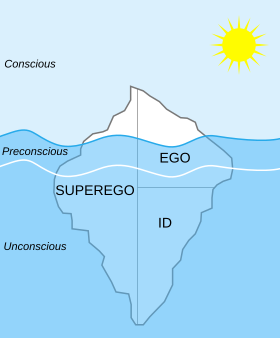
Freud was the first to create a detailed psychological model of human development based on stages. The stages are based on biological drives. Throughout our lives, our behaviour is motivated by our basic drives. These drives, however, change during the course of our lives. The objects which are the focus of our gratification change, and in turn, so does the "mode of gratification", otherwise known as the area of the body that is the centre of gratification. Freud said that it is the shifts in mode of gratification, associated with different erogenous zones or body regions that defines the different stages of development. These stages are said to play a key role in the development of personality.
Oral Stage = the oral stage is the first of Freud's Psychosexual stages. The focus of gratification is the mouth. This stage extends from birth till about 15 months of age. An infant is satisfied by nursing - in Freud's stages, nursing is not only a mean of obtaining food, it is also a primary source of pleasure, through oral stimulation. Only the id is present at birth, and as the oral stage progresses, the beginnings of the ego are formed. One aspect of this development is body image - the recognition that one's body is different and separate from the environment. Through this realization, the child begins to understand the boundaries of the body and develops a sense of self, or an ego. One of the key experiences of the oral stages is weaning, which is when a child stops nursing and begins eating normal food. When weaning occurs, much of the intimate contact that they used to experience while feeding is lost. Freud said that this is the first major loss in the child's life, and that it affects the immediacy of obtaining gratification in future stages and the child's awareness of the external world. Freud actually saw weaning as the origin of the biblical story of being cast out of Eden.
The oral stage - a personal reflection:
I personally do not remember this stage in my life, as I do not have any particular memories from that early in my life. I have also not observed this stage in other people, as I am the youngest of two children in my family and I was too young to remember any of my cousins going through this stage. While I don't think I have any serious fixation formed from the oral stage, I do have a tendency to chew gum, and I like to pop my gum very loudly when I do chew it. I also have a tendency to chew on the ends of my pens in class, or to bite at my nails.
Anal Stage = the anal stage is the second psychosexual stage. It begins at around 15 months of age and then continues till we are about three years old. The shift of the drive energy is from the mouth to the lower end of the digestive tract. Pleasure comes primarily from the process of elimination and activities related to it. As infants become toddlers, they undergo toilet training. Toilet training poses a conflict between the demands of the id and the external world. For the child, bowel movement are pleasurable, and their own feces are of interest. The external world, however, sees feces as smelly, messy and germ filled. The resolution of this conflict may be gradual and untraumatic or intense, depending on the timing and the parents involved.
The anal stage - a personal reflection:
I don't specifically remember the time of my potty training, and so I presume that it was fairly untraumatic. My parents had already potty trained my sister, and so they knew what to do, and I was potty trained fairly quickly and painlessly. I also don't think that I have any particular anal fixation left over from that stage, because I am neither excessively sloppy or compulsively neat.
Phallic Stage = The phallic stage is the third of Freud's stages, which occurs from the time we are three until we are about five years old. In this stage gratification is focused on the genitals. Genital stimulation is found pleasurable, and parents often find that children are increasingly aware of their own and other people's bodies during this stage. The phallic stage is associated with a major conflict which challenges the developing ego, known as the Oedipal conflict. The child becomes jealous of the father, because the id wishes to unite with the mother and eliminate the father as competition. The resolution of this conflict comes through adopting two defence mechanisms - identification and repression. The Oedipal conflict also applies for girls, but the roles of the father and the mother are reversed. In both sexes, the Oedipal conflict is important in the formation of the superego and in establishing the basis for sexual identity and formation of love relationships.
The phallic stage - a personal reflection:
I personally do not believe in Freud's Oedipal conflict theory. I honestly do believe that while every child struggles with their relationships with their parents, and that sometimes that these conflicts are related to attention - either neglection, or too much attention from one parent and not enough from the other. But I do not think that there is jealousy because of the father's sexual relationship with the mother. I think that the ambivalence towards the father or whoever the source of authority is is because they are just that - a source of authority. Nobody likes being told what they should do, and many people dislike voices of authority for that very reason. While I don't think that I have a particular fixation from the phallic stage, I do have a automatic dislike for figures of authority, and I have fairly negative connotations with most of the authority that I have encountered - wether it be the administration, or the government.
The Latency Stage = the latency stage is the fourth stage which begins at about 5 years of age and extends until puberty. The drives seem to be relatively inactive during this time. In part, this is due to the use of repression in resolving the Oedipal conflict. These repressed impulses are redirected into new activities such as sports, hobbies, school and friendships.
The latency stage - a personal reflection:
I remember these years of my life fairly distinctly. I was quite busy during these ages - I always had a medium size group of very close friends, and I always loved making new friends wherever I went. I played a lot of sports, and I did a lot of activities after school, and I was very focused on school, at least towards the end of the latency stage.
The Genital Stage = The genital stage is the fifth and last stage. It begins when we hit puberty and last for the rest of our lives. During this stage there is a resurfacing of drive energy, which is triggered by the physiological changes involved in puberty. At this point the individual enters the adult phase of development. The ego's secondary process thinking has become well developed at this stage and the person is directed towards new types of behaviours, including forming a love relationship, having children and assuming other responsibilities. Freud gave comparatively little attention to this stage, even though it occurs during the majority of one's life.
The genital stage - a personal reflection:
While it is hard to reflect on a stage that is still occuring, and still has a long time to play itself out, I think that Freud's idea of the genital stage is interesting, if not completely accurate. Since puberty I have definitely experienced a change in priorities, but they are not all the way Freud said they would be. For example, at this point in my life I have no desire to have children, and I am doubting if I will want to have them in the future.
The picture for this entry depicts a mother reaching to nurse a infant. (The oral stage).

